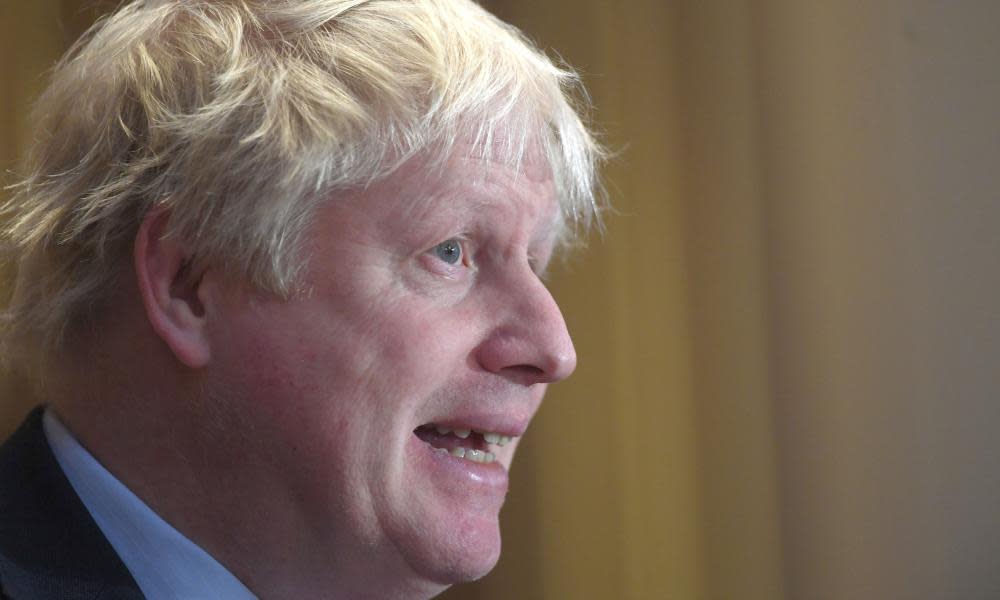Boris Johnson breaks ranks with Brexit 'vassal state' warning

Boris Johnson has insisted Britain must not become a “vassal state” of the European Union by being forced to adopt all its regulations, ahead of a crucial cabinet meeting this week on how the government will conduct Brexit talks.
The cabinet is due to meet on Tuesday for the first substantive discussion of the so-called “end state” the government should aim at in the next stage of negotiations, with Theresa May insisting she “would not be derailed” from delivering Brexit.
In a pair of defiant articles in the Sunday Telegraph and Sunday Express newspapers, after her defeat this week in the House of Commons over parliamentary scrutiny of a final Brexit deal, the prime minister said: “Amid all the noise, we are getting on with the job. In the face of those who want to talk Britain down, we are securing the best and most ambitious Brexit deal for our whole United Kingdom.”
She claimed personal credit for securing a deal with the EU27 allowing talks to progress to the next stage – as confirmed in Brussels on Friday.
But with the cabinet divided over how closely Britain should continue to align with EU rules after a transition period of around two years is over, Johnson broke ranks to insist the government must retain the freedom to set its own laws.
“What we need to do is something new and ambitious, which allows zero tariffs and frictionless trade but still gives us that important freedom to decide our own regulatory framework, our own laws and do things in a distinctive way in the future,” the foreign secretary told the Sunday Times.
He cited remarks by the chancellor – the most vocal advocate of close continued alignment with EU rules – in his recent budget, suggesting Philip Hammond was also in favour of Britain setting its own regulations.
“It was very notable in the budget speech that the chancellor majored on the idea of future regulatory divergence. Philip can see that we have a very original economy, very different from other European countries: tech sectors, bioscience, bulk data, this is a very innovative place to be. We may in future wish to regulate it in a different way from the way that Brussels does,” he said.
If Britain simply mirrored EU rules, he said, people would ask: “‘What is the point of what you have achieved?’ because we would have gone from a member state to a vassal state.”
The Brexit secretary, David Davis, has suggested a “Canada plus plus plus” deal, broadly based on the EU’s trade deal with Canada, but covering services, including financial services, and allowing closer ties because the volume of trade covered is so much larger.
Such a deal would still be likely to require considerable alignment of rules and regulations – but many Brexiters prefer it to a closer relationship such as that enjoyed by Norway, which is a member of the European Free Trade Area.
Crucially, Johnson conceded that by insisting on the right to set different regulations, Britain might suffer “trading consequences” in the negotiations with Brussels, but argued that it was worth it so Britain could become a champion of global free trade, and seek advantageous deals in other parts of the world.
Hammond sparked a fresh row this weekend when he set out clearly the fact that the government expected the transition period after Brexit day in March 2019 to “replicate the status quo”, with EU rules still in force.
That echoes the position the prime minister set out in her Florence speech, when she said: “The framework for this strictly time-limited period, which can be agreed under article 50, would be the existing structure of EU rules and regulations.”
But with the details of the transition deal due to be hammered out in the new year, some backbench pro-Brexit MPs, including Jacob Rees-Mogg and Iain Duncan Smith, are still fighting a rearguard action over aspects of that approach, including the idea of the European court of justice continuing to hold sway.
Davis has said he hopes whatever new arbitration system is agreed under the trade deal with the EU could start to operate before the end of the transition period.

 Yahoo News
Yahoo News 
